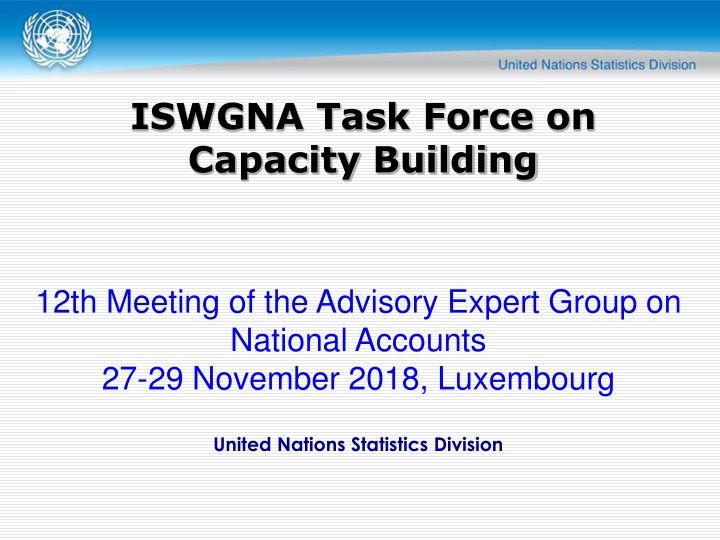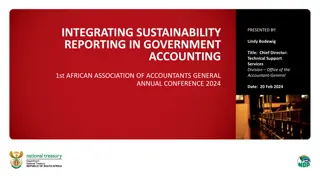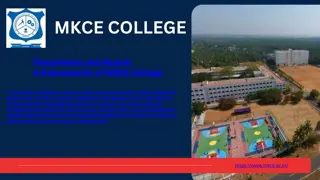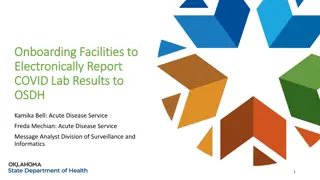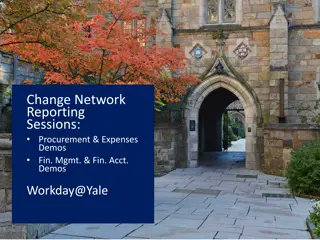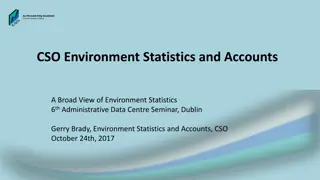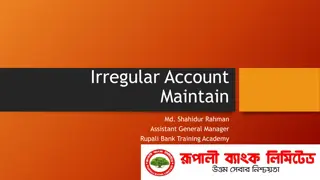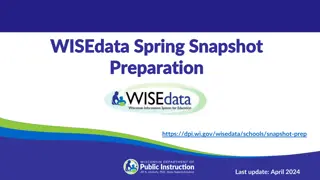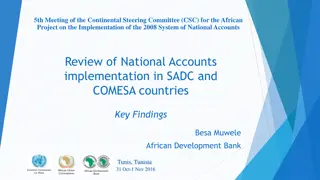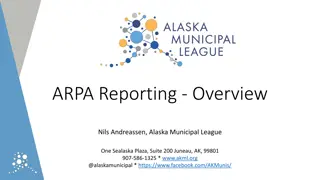Progress in National Accounts Reporting: Achievements and Challenges
This content discusses the progress in national accounts reporting, focusing on achievements in implementing the SNA and challenges related to lagging countries. It highlights the need for further SNA implementation and the formation of an ISWGNA Task Force on Capacity Building.
Download Presentation

Please find below an Image/Link to download the presentation.
The content on the website is provided AS IS for your information and personal use only. It may not be sold, licensed, or shared on other websites without obtaining consent from the author.If you encounter any issues during the download, it is possible that the publisher has removed the file from their server.
You are allowed to download the files provided on this website for personal or commercial use, subject to the condition that they are used lawfully. All files are the property of their respective owners.
The content on the website is provided AS IS for your information and personal use only. It may not be sold, licensed, or shared on other websites without obtaining consent from the author.
E N D
Presentation Transcript
ISWGNA Task Force on Capacity Building 12th Meeting of the Advisory Expert Group on National Accounts 27-29 November 2018, Luxembourg United Nations Statistics Division
Background This year marked the 10th anniversary of the adoption of the 2008 SNA There has been noticeable progress in the reporting of national accounts data from analyzing replies to United Nations national accounts questionnaire in terms of Conceptual compliance with the SNA Compliance with minimum required data set (MRDS) Timeliness 2
Achievements Implementation of SNA Conceptual compliance with the SNA All Member States 200 13 18 23 180 28 30 36 43 53 58 160 80 95 140 101 103 120 108 100 155 161 80 156 149 139 134 60 112 97 40 79 72 62 20 2 1 10 0 2007 2008 2009 2010 2011 2012 2013 2014 2015 2016 2017 2008 SNA 1993 SNA 1968 SNA Member States on 1993/2008 SNA: 180 ( 93%) in 2017 vs 134 ( 70%) in 2009 Member States on 2008 SNA: 79 ( 41%) at end of 2017 3
What more needs to be done? Implementation of SNA Too many countries are still lagging in the implementation of SNA 13 still on 1963 SNA, 101 on 1993 SNA Number of member states that meet Minimum Required Dataset Standards has remained unchanged at 102 for several years Number of member states that meet Timeliness Requirements has remained largely unchanged at ~112 for several years 4
What more needs to be done? Implementation of SNA Why are Member States lagging? Report by a Friends of the Chair group on the slow progress of the implementation SNA and production of national accounts of sufficient scope and detail 11th meeting of the AEG recommended to establish an ISWGNA Task Force on SNA Capacity Building, chaired by UNSD, to Prepare guidance based on available materials developed by the ISWGNA members and their development partners to support the practical implementation of the SNA in countries that are lagging behind 5
ISWGNA Implementation Taskforce Implementation taskforce formed, this will help balance the focus of ISWGNA attention on both research & implementation issues Taskforce formally reports through to ISWGNA (and ultimately UNSC). And will engage with AEG for advice and feedback Currently ISWGNA members are on the task force but will expand to regional bodies and NSOs 6
Elements of the work programme a) Create an inventory of tailored data sources, practices, methods, learning tools and technology in an innovative environment targeted towards the least developed, the island, and the fragile states; Encouraging a creative commons approach to sharing tools which taskforce members have already developed Make the tools as discoverable and assessible as possible 7
Elements of the work programme b) Develop, test and share new ways of working in capacity development. Using new technology and concepts of just enough design or iteration to increase the pace of national accounts capacity development and national accounts production; c) Encourage members of the taskforce to participate in joint capacity development programs in partnerships with countries and regional agencies specifically targeted regions of the world (while noting that the actual capacity building activities are outside of the remit of the taskforce and need to be run as separate projects). 8
Current Focus - Inventory The task team commenced with a stocktake of existing capacity building efforts and tools across the current members (UNSD, IMF, World Bank, Eurostat). Results of the stocktake unsurprisingly show that there is a wide range of activities occurring with a great many countries. Members have agreed to expand the UNSD National Accounts knowledge database to include capacity development tools beyond the current catalogue of handbooks. 9
Current Focus Knowledge Hub Knowledge Hub targeted towards least developed countries and those with little current capacity for national accounts Should guide users through the process and ensure tools and resources are accessible and discoverable Examples: catalogue of training materials; guidance notes; and IT tools. 10
Examples of tools to be included Information about IT systems: cost, functionality, resource requirements etc Eretes SNAP Hendyplan IMF tools Etc Catalogue of training resources Course material and content (when made available) Description of courses being run E-learning modules 11
Current Focus Sharing information on new initiatives Regular meetings (conducted via teleconference) enable members to share any new developments on capacity building and to identify opportunities for collaboration 12
AEG is requested to: provide its opinion on global capacity building efforts and the work of the Task Force; volunteer to provide any capacity building tools/resources that they have developed; volunteer to join the Task Force, particularly if they are currently engaged in substantive capacity building initiatives 13
Thank you 14
